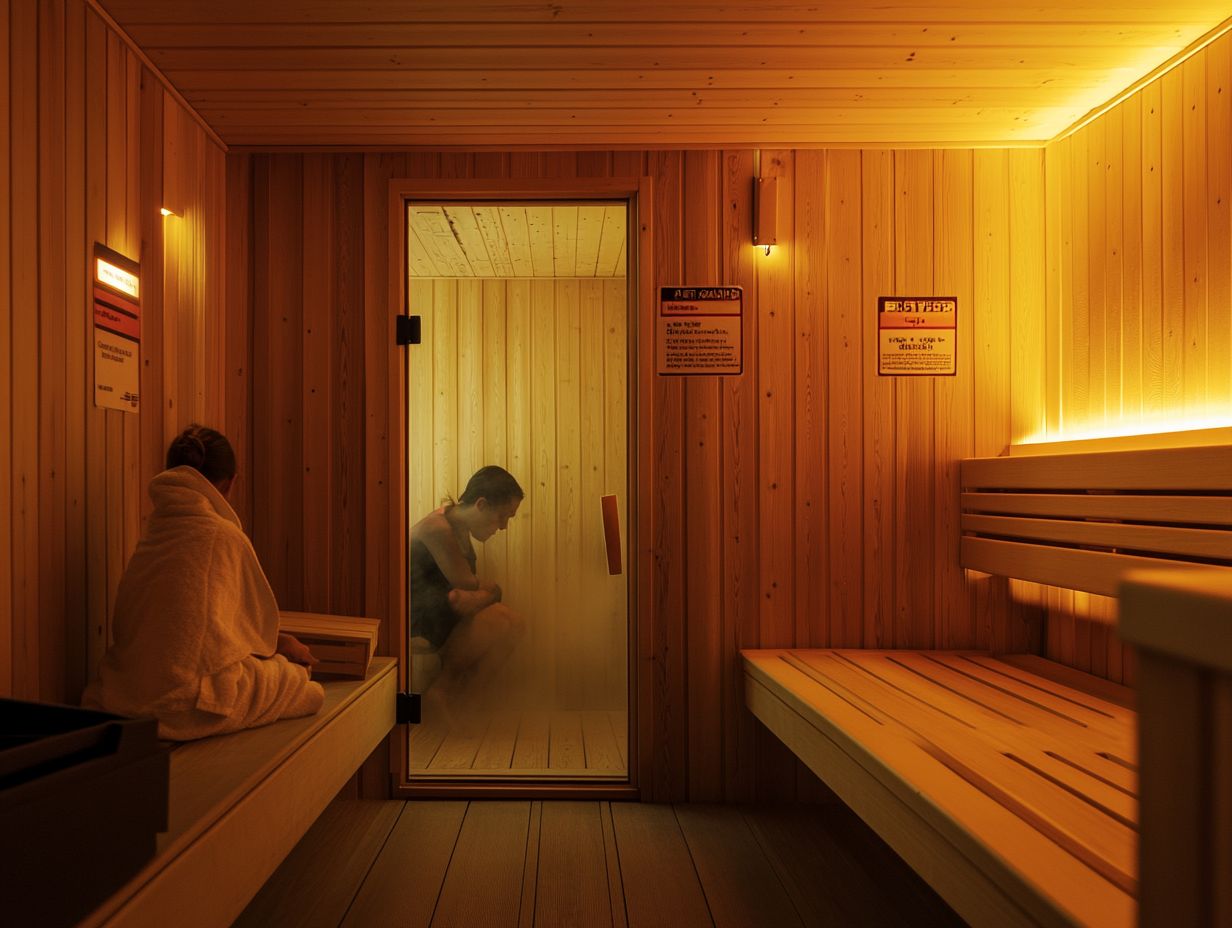Sauna Safety: Avoiding Common Injuries
Saunas provide an impressive array of health benefits, including everything from relaxation to enhanced circulation. Dive in with knowledge and caution for a fantastic experience!
This article explores the many advantages of sauna sessions and highlights potential risks. You ll find insights on preventing injuries, common issues you might encounter, and tailored safety tips for vulnerable groups such as children, pregnant women, and the elderly.
By engaging with this information, you can ensure that your sauna experience is not only safe but also thoroughly enjoyable.
Contents
Key Takeaways:

- Always stay hydrated and take frequent breaks while using a sauna to avoid potential injuries like dehydration and heat exhaustion.
- Educate yourself on sauna safety and precautions to prevent common injuries such as burns and falls.
- Special populations, including children, pregnant women, and the elderly, should take extra precautions and consult with a doctor before use.
The Benefits of Sauna Use
Sauna use has captured significant interest for its numerous health benefits. It enhances both your physical and mental well-being through time-honored practices, especially in Finland, where sauna bathing is a cultural cornerstone.
Regular sauna sessions can improve your cardiovascular health by regulating blood pressure and boosting circulation. They also promote deep relaxation and alleviate stress.
Different types of saunas, like infrared saunas and traditional saunas, offer unique experiences and benefits, making sauna use an adaptable and enriching part of your wellness routine.
Improving Health and Well-being
Regular sauna use is a transformative practice that can greatly enhance your health and well-being, offering benefits such as better cardiovascular health and reduced chronic pain.
This tradition promotes better circulation essential for a robust heart and can boost cognitive function, sharpening your memory and overall brain health. Many find that the soothing warmth of the sauna alleviates discomfort from musculoskeletal disorders, providing relief from chronic pain by relaxing tense muscles and joints.
By engaging in regular sauna sessions, you can help yourself recover faster after workouts and improve joint flexibility, paving the way for a more active lifestyle. Ultimately, embracing this wellness ritual can lead to profound improvements in your physical and mental vitality.
Understanding Sauna Safety
Understanding sauna safety is essential to fully appreciate its benefits while minimizing health risks. Consider factors such as heat exposure, hydration, and adherence to proper sauna guidelines.
By prioritizing a safe sauna experience, you can effectively prevent issues like dehydration and heat-related problems, allowing you to enjoy the therapeutic effects of sauna use with peace of mind.
Start your sauna journey today for a healthier you!
Potential Risks and Injuries

While using a sauna is generally a safe and rejuvenating experience, it s essential to be aware of the potential risks and injuries that can arise from improper practices. Dehydration and heatstroke are two significant concerns that must be addressed to ensure you have a safe and enjoyable time.
Failing to stay adequately hydrated can lead to losing important fluids, which may result in severe health consequences. The high temperatures inside the sauna can cause your body s core temperature to rise rapidly, significantly increasing the risk of heatstroke. If this condition goes unrecognized, you might experience symptoms like dizziness, confusion, or even a loss of consciousness.
To avoid these dangers, prioritize drinking plenty of water before and after your sauna sessions. Limit your time inside and always listen to your body s signals. Check the sauna’s temperature and avoid alcohol beforehand to reduce risks.
Preventing Sauna Injuries
Preventing sauna injuries is crucial for maximizing the health benefits and ensuring a safe experience. Make sure you follow the right techniques for a better sauna experience!
Monitoring your health before and during sauna sessions is key; it allows you to stay within safe limits and avoid any adverse effects related to lung problems and other medical conditions.
Proper Precautions and Techniques
Implementing proper precautions and techniques is essential when you embark on a sauna session. This involves carefully regulating both the duration and temperature of your time inside, while ensuring you stay hydrated throughout the experience.
To enhance your safety, it s vital to continuously monitor the sauna s temperature, keeping it within recommended guidelines for optimal comfort and health benefits. Aim to limit your time in the sauna to about 15-20 minutes per session. Listening to your body is crucial; be attentive to any signs of overexposure, such as dizziness or overheating.
Staying adequately hydrated before, during, and after your sauna session is equally important. This not only counters fluid loss but also promotes your overall well-being. By creating a safe sauna environment, you can fully enjoy the therapeutic benefits while minimizing any associated risks.
Common Sauna Injuries and How to Treat Them
Common sauna injuries, such as burns, dehydration, and various heat-related illnesses, underscore the critical need for effective treatment measures and safety practices. By implementing these precautions during sauna use, you can significantly reduce the risks and ensure a more enjoyable experience.
Burns, Dehydration, and More

Burns and dehydration are common injuries linked to sauna use, requiring your immediate attention and effective treatment to ease discomfort and restore hydration, as well as monitor for any signs of chronic tension.
These injuries often arise from extended exposure to high temperatures and insufficient fluid intake during your sessions. For example, burns can happen from direct contact with hot surfaces or water, while dehydration typically results from sweating without replenishing those lost fluids.
Treating burns may involve cooling the affected area and applying soothing ointments. You can restore hydration by consuming water or electrolyte solutions.
To prevent these issues, keep an eye on the time spent in the sauna, ensure you re well-hydrated before and after use, and be mindful of your individual heat tolerance.
Sauna Safety for Different Populations
In terms of sauna safety, it’s essential to recognize that different populations such as children, pregnant women, and the elderly have unique considerations. Each group requires tailored guidelines to ensure their well-being and to create a safe sauna experience.
Understanding these nuances is key to enjoying the benefits of sauna use while prioritizing safety.
Special Considerations for Children, Pregnant Women, and Elderly
When using a sauna, special care is needed for vulnerable groups. This includes children, pregnant women, and the elderly, as they face unique health risks.
These groups often experience greater changes in body temperature and hydration levels. For children, keep sauna sessions to 10 to 15 minutes, and ensure they take hydration breaks.
Pregnant women should consult their healthcare provider before using a sauna. Limit sessions to 10 minutes in a well-ventilated sauna.
Elderly individuals, especially those with health conditions, should start with very short sessions. Gradually increasing time is important while paying attention to how their bodies respond.
Everyone must stay hydrated before, during, and after sauna use. These precautions ensure a safe and enjoyable experience.
Frequently Asked Questions
What are the most common injuries that can happen in a sauna?

The most common injuries in a sauna include burns, fainting, dehydration, and heat exhaustion.
How can I avoid burns in a sauna?
To avoid burns, always test the temperature of the sauna before entering and avoid placing your skin directly on hot surfaces.
What should I do if I start feeling dizzy or lightheaded in a sauna?
If you start feeling dizzy or lightheaded, immediately leave the sauna and cool down. Drink plenty of water to rehydrate and rest until you feel better.
Can I use a sauna if I have a medical condition?
Always consult your doctor before using a sauna if you have a medical condition. Heat can worsen conditions like cardiovascular or pulmonary diseases.
How can I prevent dehydration in a sauna?
To prevent dehydration, make sure to drink plenty of water before, during, and after using a sauna. Avoid alcohol and caffeine, as they can further dehydrate your body.
Is it safe to use a sauna alone?
No, it is not recommended to use a sauna alone. Sauna safety guidelines suggest that it is always best to have someone with you in case of any accidents or medical emergencies.






